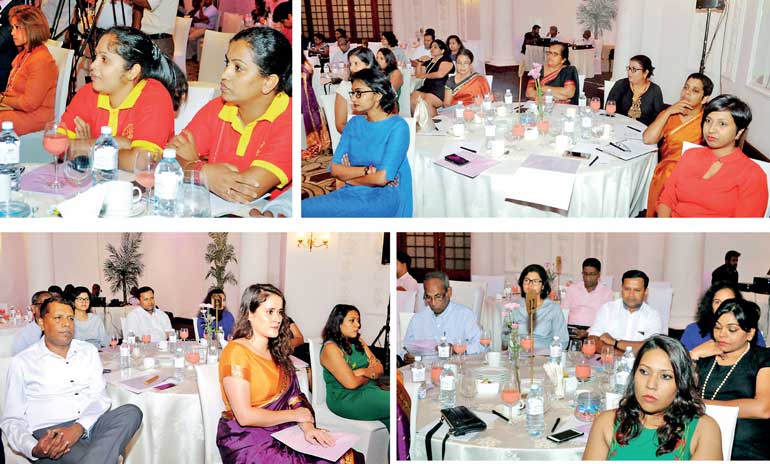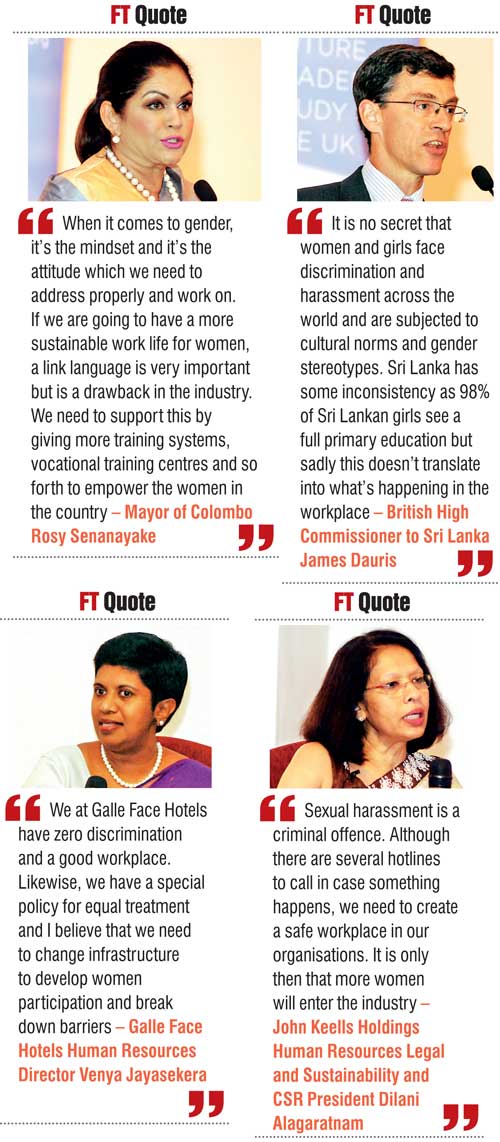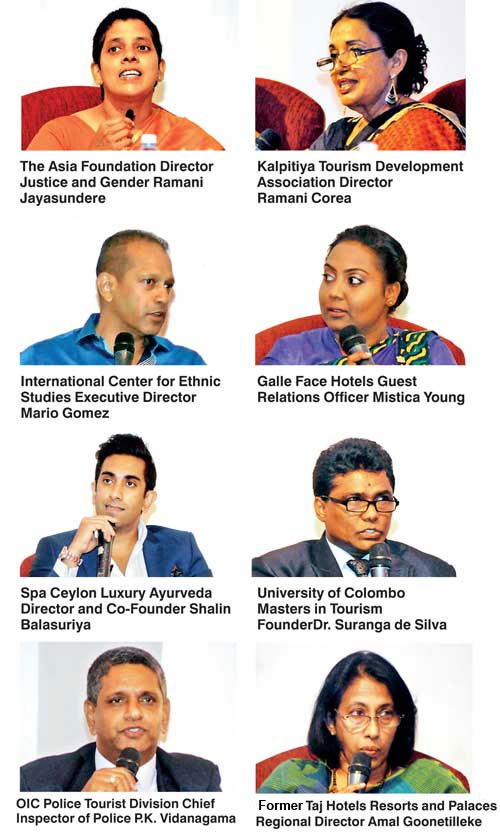Friday Feb 27, 2026
Friday Feb 27, 2026
Tuesday, 13 March 2018 00:11 - - {{hitsCtrl.values.hits}}



By Shannon Jayawardena
A national conference on promoting a sustainable work life for women in the tourism and hospitality sector, raising awareness on women’s equality in labour participation, took place on 8 March at the Galle Face Hotel.
The event highlighted the opportunities for women in the two sectors and invited several professionals to discuss the challenges that hinder women’s participation while sharing insights and advice on the matter.
Chief Guest Mayor of Colombo Rosy Senanayake said: “When it comes to gender, it’s the mindset and it’s the attitude which we need to address properly and work on. If we are going to have a more sustainable work life for women, a link language is very important but is a drawback in the industry. We need to support this by giving more training systems, vocational training centres and so forth to empower the women in the country.”
According to UN Women, gender inequality is manifested in a reality that women perform 66% of the world’s work, produce 50% of the food but earn only 10% of the income and 1% of its property. British High Commissioner to Sri Lanka James Dauris noted: “It is no secret that women and girls face discrimination and harassment across the world and are subjected to cultural norms and gender stereotypes. Sri Lanka has some inconsistency as 98% of Sri Lankan girls see a full primary education but sadly this doesn’t translate into what’s happening in the workplace.”
Sri Lanka’s female labour force participation rate has remained static with a total of 35.5% within the last decade whereby according to the Annual Statistical Report of the Sri Lanka Tourism Development Authority, tourism has continued to be the third highest foreign exchange earner with a contribution of $ 3.5 billion.
Both direct and indirect employment generated in the tourism sector has grown from 319,436 jobs in 2015 to 335,569 jobs in 2016, with a growth rate of 5.1%, hence there are many open spaces for female labour participation. The conference then organised two panel discussions on preventing harassment to promote increased female participation in the hospitality sector and the need for a positive image and perception of women in the hospitality service sector to prevent discrimination.
The first panel was moderated by Asia Foundation Director Justice and Gender Ramani Jayasundere and saw Galle Face Hotels Human Resources Director Venya Jayasekera, Kalpitiya Tourism Development Association Director Ramani Corea, John Keells Holdings Human Resources Legal and Sustainability and CSR President Dilani Alagaratnam and Galle Face Hotels Guest Relations Officer Mistica Young function as panellists.
Speaking on retaining women in the hospitality sector workforce and the need to provide a positive work environment, Jayasekera said: “We at Galle Face Hotels have zero discrimination and a good workplace. Likewise, we have a special policy for equal treatment and I believe that we need to change infrastructure to develop women participation and break down barriers.”
Some of the key obstacles faced by women workers are the unequal pay for equal work, harassment at work, regular working hours, gender-based discrimination especially in accessing career opportunities and work-life balance, including managing family with work.
Focusing on women as hospitality leaders and its challenges, Corea encouraged women to “encounter cultural barriers, try not to take no for an answer and try not to lose your cool in the face of prejudice.” She added that she believes “women are hardworking, creative, flexible, nurturing and naturally collaborative.”
However, women in the workforce are often given unskilled and low-paying jobs. Issues of gender-based violence, sexual harassment at work and structural and cultural barriers especially hinder female workers in the tourism and hospitality sector due to the nature of work, including working hours.
Talking about handling gender-based violence, including sexual harassment at the workplace, through human resources management and corporate social responsibility initiatives, Alagaratnam said: “Sexual harassment is a criminal offence. Although there are several hotlines to call in case something happens, we need to create a safe workplace in our organisations. It is only then that more women will enter the industry.”
Sri Lanka’s development vision has included targeting 600,000 jobs, with women accounting for 10% of the tourism sector workforce, and foreign income of $ 7 billion by 2020. There is a growing need to analyse the situation of women workers in various industries while implementing the existing labour laws more effectively.
Tackling the subject of dignity at work policies and procedures with employers for women workers in the hospitality sector, Young said: “I feel so happy working in the hospitality sector and I wish more women would participate in the industry. If anything they should be more open, stand up for themselves and seek help while sharing their ideas.”
The tourism industry is viewed as an important engine for development through foreign exchange earnings and the generation of direct and indirect employment, hence it plays a vital role in gender equality and gender empowerment of women workers.
The first panel was moderated by International Center for Ethnic Studies Executive Director Mario Gomez and included University of Colombo Founder Program Coordinator of the Master’s in Tourism Dr. Suranga de Silva, Spa Ceylon Luxury Ayurveda Director and Co-Founder Shalin Balasuriya, OIC Police Tourist Division Chief Inspector of Police P.K. Vidanagama and former Taj Hotels Resorts and Palaces Regional Director - Sales and Marketing Amal Goonetilleke as panellists.
Speaking on the role and participation of women workers in hotels, catering and tourism, Dr. de Silva noted: “Diligence of the population is being lost and at present women feel like they are hopeless but this is the best industry that can bridge the gender gap. Having good awareness within society and the industry is how we can promote women participation in the tourism industry.”
Many studies identify sexual harassment as one of the major factors for the low participation of women in the sector while unwanted attention or intimidation of a sexual character is extensive in the tourism industry as well.
Sharing his perspectives on the structural and cultural issues affecting women workers in the spa industry, Balasuriya said: “In Sri Lanka there are so many employment opportunities and so much we can generate from the spa industry. The perception of the word spa is the biggest problem. A spa has turned out to become a dirty word and is causing so many problems. The spa industry is a great source of employment.”
Action against sexual harassment not only ensures safe working places for both women and men but strengthens human resource policies and good HR practices that address the social stigma.
Stressing on the role of the tourist police in ensuring women’s right to work with dignity in the hospitality sector, Vidanagama stated: “During 2016-2017 only two complaints were made by tourists over sexual harassment, so we encourage everyone to report any form of sexual abuse to the police immediately. Women should have equal rights and stand up for themselves.”
According to the Sri Lanka labour force survey, women represent 55% of the total population of 18 years and above. However, their labour force participation is 36% and the unemployment rate for all women is at 7%.
Speaking on behalf of women in the travel sector as a key employer of women in the country, Goonetilleke said: “There are so many opportunities for women in the tourism sector but only 3% of employees in the hotel industry are women. So the industry must take proper measures to change this.”
She noted that at least 12,500 more women should be employed by 2020 to reach the Government’s goal of 10% women participation in the labour force.
Pix by Gitika Talukdar